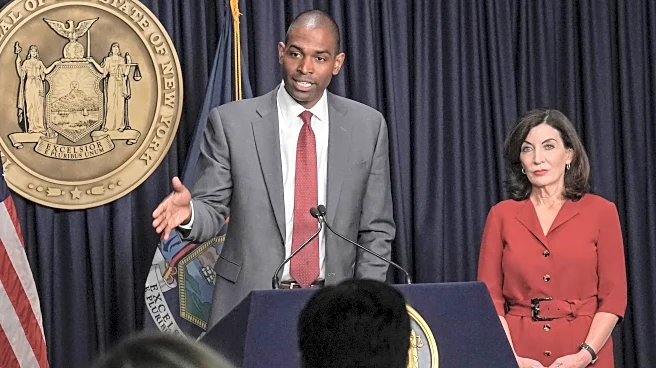What's Happening?
The Dallas Cowboys suffered a significant setback after losing 27-17 to the Arizona Cardinals, dropping their record to 3-5-1. Despite owner Jerry Jones' efforts to bolster the team through trades, including acquiring defensive tackle Quinnen Williams
from the Jets, the Cowboys remain far from playoff contention. The team's offensive struggles were evident as they managed only one touchdown against Arizona, highlighting the need for near-perfect performance to compensate for defensive weaknesses. The Cowboys have defeated only low-ranking teams this season, and their upcoming schedule includes challenging matchups against playoff-caliber teams, making their path to the playoffs increasingly difficult.
Why It's Important?
The Cowboys' current predicament underscores the challenges faced by teams in the NFL when attempting to recover from a poor start to the season. The acquisition of Quinnen Williams, while a strategic move, may not be sufficient to address the team's broader issues. The Cowboys' inability to secure wins against stronger opponents raises questions about their competitiveness and strategic direction. This situation impacts the team's fan base, financial prospects, and overall standing in the league, as missing the playoffs could lead to significant changes in management and player roster.
What's Next?
The Cowboys must navigate a tough schedule, including games against the Eagles, Chiefs, Vikings, Lions, and Chargers. To have any chance at the playoffs, they need to win at least six of their remaining eight games. This requires not only overcoming strong opponents but also avoiding losses against weaker teams. The team's management may need to reassess their strategy and make further adjustments to improve performance. The outcome of these games will likely influence decisions regarding coaching staff and player contracts in the offseason.
Beyond the Headlines
The Cowboys' situation highlights broader issues within the NFL, such as the impact of injuries and the importance of strategic trades. The team's reliance on trades to improve performance reflects a common approach in professional sports, where immediate results are often prioritized over long-term development. This case also illustrates the pressure on team owners and management to deliver results, which can lead to high-stakes decisions with lasting consequences.

















